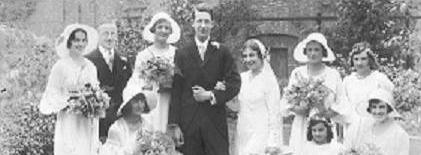The family was comfortably well off, having made money in real estate and trade. Franklin grew up surrounded with family love and attention, but isolated by being schooled by private tutors. At 14 he was sent off to the Groton School in Massachusetts. Neither an athlete nor a rebel, FDR wasn't especially popular, but he made an effort to be appreciated by his teachers, who exhorted the children of wealthier parents to help the less fortunate.
At Harvard, FDR pursued an active social life rather than scholarship. He loved to meet new people and was eager to lead. After marrying his cousin Eleanor and graduating from law school, he entered politics in 1910 at the request of some fellow New York Democrats. He was enthusiastic and optimistic, which served him well later when he faced his own illness and then as President the challenges of the Depression and World War II.
He was diagnosed with polio in 1921. Eleanor Roosevelt said:
He had real fear when he was first taken ill, but he learned to surmount it. After that I never heard him say he was afraid of anything.He never gave up hope of recovery, and concealed the extent of his paralysis from the public, with the cooperation of the media.
FDR liked watching cartoons (he loved Mickey Mouse), collecting stamps, playing cards and bird-watching. For his health he built a pool he swam in at the White House. He held a nightly cocktail hour for his close associates. Besides the formal state dinners, Franklin and Eleanor hosted teas, children's parties, dances, cocktail parties, and game nights. Sometimes, Roosevelt would lead a sing-along, and his birthday parties had friends and family performing comedy skits. Guest lists were often twice what had been planned for. Last-minute invitations to guests to stay overnight were extended when all the White House rooms were already full. The Roosevelts had 28,000 visitors in one year, 1936.
Once the war started, they hosted fewer events, but their scale remained large. Two thousand people attended FDR's 1945 inaugural luncheon, and consumed 200 chickens in the chicken salad, 170 dozen rolls, 100 gallons of coffee, and 165 cakes.
FDR's Scottish terrier, Fala ("Murray, the Outlaw of Falahill") accompanied the President on his travels and slept at night in his own chair at the foot of FDR's bed. He was given a bone every morning, and FDR fed him at night. He needed his own secretary to handle all the mail he received from American fans.When FDR died of a cerebral hemorrhage in 1945, the dog was inconsolable. Eleanor said that Fala spent the rest of his life waiting for his master to return. (The above is abbreviated from a biographical sketch by Garrison Keillor.)
Personal Comment
My father, Ervin Ross ("Spike") Marlin, won a place in FDR's administration through a competitive examination taken by thousands of people in 1932. He told me later - "I never felt so rich as when I had a government job in the Depression." In our house, growing up, FDR and Winston Churchill were godlike.
I have learned a lot about FDR through my research for a biography of FDR's first Treasury Secretary, William H. Woodin, whose contribution to calming the financial panic (and the cost of this effort to his health) has been under-appreciated. Woodin focused on addressing the liquidity issues by printing huge amounts of currency for the banks, while refusing to reopen the insolvent banks after the Bank Holiday. He supported the Glass-Steagall Act that put a ring around the banks in return for their deposits being insured. It was 75 years before this fine financial system collapsed, but it was undermined steadily for year before that. The Steagall portion of the Act, i.e., deposit insurance, has survived, but that was supposed to have been a favor for the banks in return for the Glass part of the bill.
Woodin worked with FDR on supporting his Warm Springs foundation to provide care for indigent people with polio. FDR's democratic instincts were revealed by his wish to have his face be on the lowly dime rather than on paper money.

